Finland helps WPF provide hot meals to children in Nampula province, northern Mozambique
Mozambique becomes the 46th country to join the Blue Heart Campaign against Trafficking in Persons
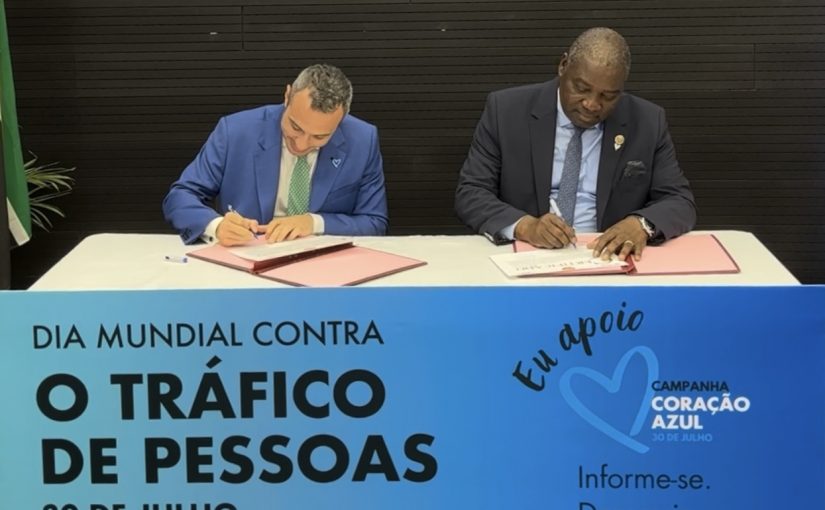
Photo: United Nations Office on Drugs and Crime (UNODC)
Mozambique becomes the 46th worldwide to join the Blue Heart Campaign, a global initiative of the United Nations Office on Drugs and Crime (UNODC) that mobilizes governments, the private sector and civil society to prevent and combat trafficking in persons.
With this accession, Mozambique becomes the 15th African country – and the second in Southern Africa, after Zimbabwe – to join the campaign.
The accession was formalized, carried out on the World Day against Trafficking in Persons, 30 July, by the Minister of Justice, Constitutional and Religious Affairs of Mozambique, Mateus da Cecília Finiasse Saize, and the Head of the UNODC Office in Mozambique, Antonio De Vivo.
The ceremony was also attended by the Deputy Prosecutor General of Mozambique, Amabélia Chuquela, and the Norwegian Embassy in Mozambique, represented by Øystein Evenstad, whose support enables UNODC’s support in countering Trafficking in Persons in Mozambique.
“May the Blue Heart, which shines from today onward in Mozambique, be a symbol of hope, protection and justice for all,” said the Minister of Justice, Constitutional and Religious Affairs.
“By joining the campaign, we reinforce our institutional engagement at the highest level and express to the national and international community the determination of the government of Mozambique to prevent, combat and eradicate all forms of human exploitation,” he concluded.
“The World Day Against Trafficking in Persons, marked on 30 July, is more than a symbolic date. It is an opportunity to take stock and renew commitments,” remarked the head of the UNODC Office in Mozambique, Antonio De Vivo.
“And this 30 July is particularly special for Mozambique. As a firm partner of Mozambique in the fight against human trafficking, it is an honor to have supported the government in this process that today culminates in joining the campaign, a milestone that we welcome and celebrate,” said De Vivo.
Human trafficking is become more organized, more structured and more ruthless
The global campaign for the International Day to Combat Trafficking in Persons focused on the theme “Human Trafficking: End the Exploitation”.
As UNODC Executive Director Ghada Whaly explains, “Human trafficking no longer hides in the shadows. It operates under a tenuous disguise, embedded in our economies and in our daily lives. And it is becoming more organized, more structured, and more ruthless.”
UNODC’s 2024 Global Report on Trafficking in Persons 2024 shows that organized crime networks are at the origin of 74% of detected cases.
“Traffickers are infiltrating legitimate industries, from agriculture to construction and hospitality, masked by legal contracts and buried in supply chains. Forced labour now accounts for 42 percent of detected trafficking victims, the highest on record,” Whaly warns.
“Trafficking for forced criminality is also surging, jumping from 1 per cent a decade ago to 8 per cent today. And traffickers are adapting, using technology and digital platforms to recruit, ensnare, and abuse. From fake job offers to dating apps, women and girls are being lured into online sexual exploitation, while victims are being made to commit cyber-scams and fraud as part of a billion dollar industry.”
In Mozambique, the risks of trafficking in persons are heightened by natural disasters and conflict, which create vulnerable conditions that criminal networks exploit to recruit and abuse victims.
A multisectoral and organized effort against an organized crime
In July 2025, Mozambique intensified its campaign against Trafficking in Persons, led by the National Reference Group on Trafficking in Persons – a multisectoral task force supported by the international community, including UNODC. Over the final two weeks of the month, the campaign reached key audiences at strategic locations across the country.
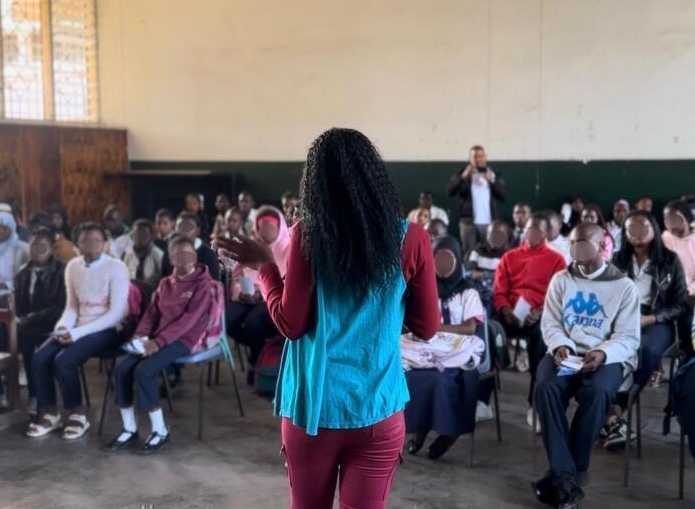
In four secondary schools, hundreds of students attended awareness-raising lectures focused on identifying risk factors and adopting self-protection measures. Speaking to the youth, Rosa Maciel, from Mozambique’s national radio service, encouraged them to take the message forward:
“You now hold this knowledge – become agents of change by sharing it with other boys and girls.”
The Reference Group also conducted outreach at Maputo’s regional and international bus terminals, engaging with drivers and passengers to raise awareness of trafficking indicators.
“One sign of human trafficking is when someone travels without identification documents. This may indicate that the person is being controlled by a trafficker,” explained Joelma Dade, a task force member representing the Ministry of Transport and Logistics.
To ensure access to information and justice, the National Reference Group also organized a legal fair in Maputo, where citizens received legal assistance related to trafficking cases and other criminal justice-related services, bridging the gap between institutions and communities and reinforcing national efforts to combat this crime.
This year’s campaign further engaged university students through an academic forum on trafficking in persons, organized by the Attorney General’s Office in collaboration with UNODC. The event brought together over 40 students from ten higher education institutions, as well as researchers, civil society actors, and representatives from various government sectors.
As guardian of the United Nations Convention against Transnational Organized Crime and the United Nations Protocol to Prevent, Suppress and Punish Trafficking in Persons, Especially Women and Children, UNODC will continue to support Mozambique in building a robust, coordinated and evidence-based response that protects victims, holds perpetrators accountable and strengthens institutions, in accordance with international standards.
This year’s campaign further engaged the academic community through an academic forum on Trafficking in Persons, organized by the Attorney General’s Office in collaboration with UNODC. The event brought together over 40 students from ten higher education institutions, as well as researchers, civil society actors, and representatives from various government sectors.
“I want to start an advocacy and awareness organization focused on trafficking in persons and vulnerable groups. The discussions at this forum gave me valuable insight into how I can bring this idea to life,” shared a student from Joaquim Chissano University.
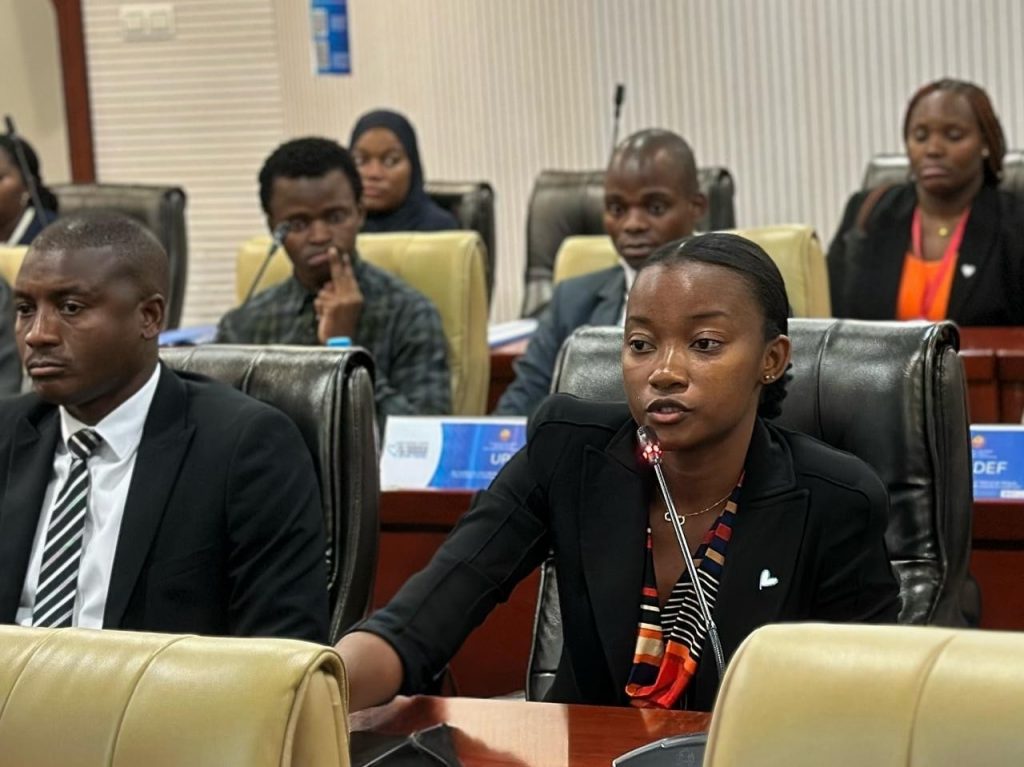





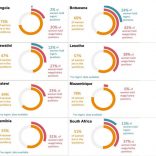

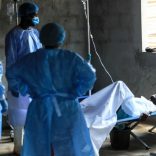




Leave a Reply
Be the First to Comment!
You must be logged in to post a comment.
You must be logged in to post a comment.